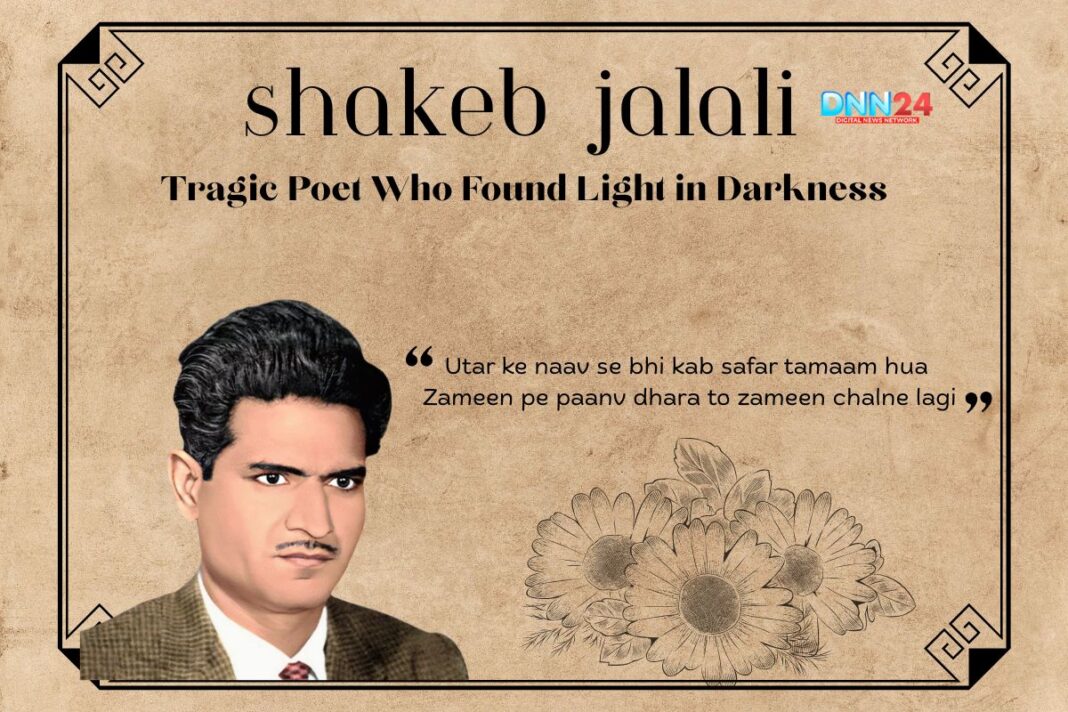Syed Hassan Rizvi was born on October 1, 1934, in the quiet village of Jalal near Aligarh. This little boy would grow up to become the famous poet Shakeb Jalali, but his childhood was filled with sadness that most children never face. When Shakeb was only ten years old, his mother died in a terrible accident. This loss broke his father completely. Unable to handle the pain of losing his wife, his father lost his mind and died soon after. At such a young age, Shakeb was left alone with his two sisters, forced to become an adult when he should have been playing and studying.
Tu ne kaha na tha ki main kashti pe bojh hoon
Shakeb Jalali
Aankhon ko ab na dhaanp mujhe doobte bhi dekh
This early suffering taught Shakeb about life’s harsh realities, but it also gave him something special. The pain he felt as a child later became the source of his beautiful poetry. His friends from those days remember him as a boy who was different from others. His eyes held both sadness and love, and he seemed to understand things that other children could not. Life had already started writing its story in his heart, using tears and hope as its central themes.
Bad-qismati ko ye bhi gawaara na ho saka
Shakeb Jalali
Hum jis pe mar mile vo hamaara na ho saka
There is a touching story from his teenage years that shows his love for poetry. One night, feeling lost and alone, Shakeb sat under the open sky and wrote verses on scraps of paper he had collected from local shops. He spent two whole nights writing by moonlight, pouring his feelings into words. Later, he gave these handwritten poems to a book seller in Badayun, who would read them aloud every Friday to whoever would listen.
Koi bhoola hua chehra nazar aaye shayad
Shakeb Jalali
Aaina ghaur se tu ne kabhi dekha hi nahin
Leaving Home and Finding New Struggles
The partition of India in 1947 changed everything for Shakeb Jalali. Like millions of other families, he had to leave his birthplace and move to Pakistan. This journey was not easy. It was filled with fear, hunger, and uncertainty. The young poet had to say goodbye to the only home he had ever known and start life in a completely new place. This experience of leaving everything behind added new layers of pain to his already wounded heart.
Aaj bhi shayad koi phoolon ka tohfa bhej de
Shakeb Jalali
Titliyan mandla rahi hain kaanch ke guldaan par
Shakeb first settled in Rawalpindi with his sisters. Life in this new country was hard. They had very little money, and every day was a struggle to survive. Despite these difficulties, Shakeb managed to complete his education in Rawalpindi and Sialkot. He survived on scholarship money and worked part-time jobs to support himself and his sisters. Even when he had very little, his love for poetry never died. He would walk for miles to attend poetry gatherings, sometimes wearing torn shoes, to share his verses with others.
Socho to silvaton se bhari hai tamaam rooh
Shakeb Jalali
Dekho to ik shikan bhi nahin hai libaas mein
One story from this time shows both his pride and his humble nature. After being rejected from a good job because he was a refugee, Shakeb decided to work as a proofreader at a newspaper in Lahore. During the day, he would correct news articles, and at night, he would write his own ghazals. His colleagues remember him as someone who never showed his pain at work. He would smile, share tea, and joke with everyone. But in the quiet coffee houses of old Lahore, he would write poems that expressed all his grief and longing for home.
Jaati hai dhoop ujle paron ko samet ke
Shakeb Jalali
Zakhmon ko ab ginunga main bistar pe let ke
The Poet Finds Love and Recognition
In 1956, Shakeb Jalali married Syeda Mohiddisa Khatoon, hoping to find some peace and happiness in his life. Their love was quiet and beautiful. Shakeb would write secret poems for his wife and read them to her during their evening walks by the canal in Lahore. For a while, it seemed like happiness had finally found its way to the troubled poet. His talent was also being recognised in literary circles. At poetry gatherings called mushairas, people would eagerly wait to hear his ghazals. Other poets would try to match his depth and emotional honesty, but few could.
Ye ek abr ka tukda kahaan kahaan barse
Shakeb Jalali
Tamaam dasht hi pyaasa dikhai deta hai
There is a famous story about a literary debate in Lahore that became very important for Shakeb’s reputation. One evening, a well-known poet challenged him in public, saying that Shakeb’s poetry was “too dark to inspire people truly.” Without hesitation, Shakeb composed an impromptu ghazal about finding hope in darkness.
Log dete rahe kya kya na dilaase mujh ko
Shakeb Jalali
Zakhm gahra hi sahi zakhm hai bhar jaayega
He ended with a couplet that silenced everyone in the room: “hum us se bach ke chalte hain, jo raasta aam ho jaaye” (We avoid those paths that everyone walks on). This moment earned him lifelong respect in the poetry world and established him as an original voice who refused to follow the crowd.
Rahta tha saamne tera chehra khula hua
Shakeb Jalali
Padhta tha main kitaab yahi har class mein
Shakeb was not just a talented poet but also a kind friend to many. He would help young poets by lending them books or guiding them in writing better poems. One story tells of how he spent an entire night helping a struggling writer improve his poem, giving up his own sleep just to be helpful. His acts of kindness won him many admirers, though his own sensitive heart remained difficult to heal.
Mujhe girna hai to main apne hi qadmon mein girun
Shakeb Jalali
Jis tarah saaya-e-deewaar pe deewaar gire
The Final Years of Sadness and Beauty
Even though Shakeb had built a family and earned respect as a poet, his inner pain never really went away. The early loss of his parents and the trauma of leaving his homeland had left deep scars that even his beautiful poetry could not heal completely. His job at the Thal Development Authority required him to move frequently to remote places like Joharabad and Bhakkar.
‘Shakeb’ apne taaruf ke liye ye baat kaafi hai
Shakeb Jalali
Hum us se bach ke chalte hain jo rasta aam ho jaaye
These postings often left him alone, away from the literary circles of big cities. It is said that during these lonely nights, he would sit by railway tracks, letting the sound of passing trains mix with his verses. This image of trains, movement, and departure became a central theme in his later ghazals.
Malboos khush-numa hain magar jism khokhle
Shakeb Jalali
Chhilke saje hon jaise phalon ki dukaan par
Shakeb’s poetry during this period was sincere and filled with questions about life’s meaning. His ghazals did not hide sorrow but sang about it with such musical grace that they comforted others who were also suffering. His style became known as a perfect blend of traditional Urdu poetry and modern emotions. People found in his verses what they could not express about their own pain and longing. There is a story of one winter night when Shakeb sat outside his home, reading his poems aloud to the moon, as if hoping for a reply from the universe itself.
Bhigi hui ik shaam ki dahliz pe baithe
Shakeb Jalali
Hum dil ke sulagne ka sabab soch rahe hain
On November 12, 1966, at the young age of 32, Shakeb Jalali ended his own life by jumping in front of a train in Sargodha. The literary world was shocked by this sudden loss. Friends and fellow poets mourned the death of a star that had burned too briefly but had shone very brightly during its short life.
Pehle to meri yaad se aayi haya unhen
Shakeb Jalali
Phir aaine mein choom liya apne aap ko
A Light That Still Shines Today
Today, Shakeb Jalali is remembered not just as a poet who suffered, but as a creator who turned his pain into something beautiful that helps others. His poetry collections, especially “Roshni Aye Roshni” and “Kulliyat-e-Shakeb Jalali,” are still read and loved by people all over the world.
Kya kahun deeda-e-tar ye to mera chehra hai
Shakeb Jalali
Sang kat jaate hain barish ki jahan dhaar gire
His verses continue to inspire millions of readers, young poets who are dealing with their own struggles, and anyone who is trying to find hope during difficult times. Every November, on his death anniversary, people gather to read his poetry, keeping his memory and message alive.
Yoon to saara chaman hamaara hai
Shakeb Jalali
Phool jitne bhi hain paraaye hain
Shakeb’s life teaches us that true greatness often comes from honesty, struggle, and the courage to express what others are afraid to say. He showed that even when life is tough, it is possible to create something beautiful from that difficulty. His journey from a small village boy in Jalal to a celebrated poet, though marked by tragedy, proves that sensitive souls can create art that makes the world a better place. His poetry reminds us that even in our darkest moments, there is always a possibility of finding light.
Faseel-e-jism pe taaza lahu ke chhinten hain
Shakeb Jalali
Hudood-e-waqt se aage nikal gaya hai koi
The story of Shakeb Jalali will always inspire those who believe that words have the power to heal, that poetry can be a bridge between pain and hope, and that even the shortest life can leave a lasting impact on the world. His legacy continues to shine like the “roshni” (light) he wrote about so beautifully in his verses.
Also Read: Deep Narayan Nayak: Teacher of the Street Who Turned Walls into Blackboards
You can connect with DNN24 on Facebook, Twitter, and Instagram and subscribe to our YouTube channel.



